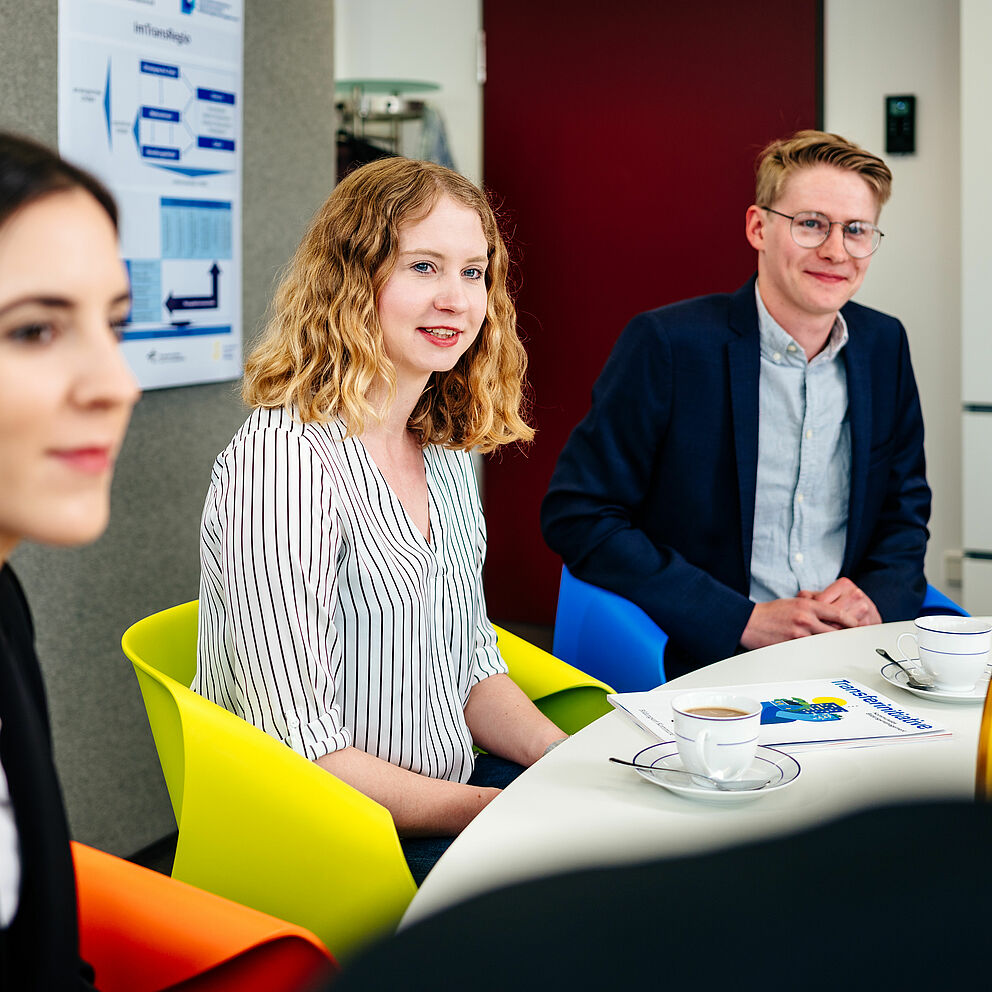Starting Your Doctorate
Paderborn University is s a modern research and educational institution in one of the major economic regions in Germany: Ostwestfalen-Lippe (“OWL,” East Westphalia-Lippe). Paderborn University is a campus university that offers excellent research facilities, a lively start-up culture, a close-knit community and support structures, as well as a reliable yet varied environment for your research. Learn more about doing your doctorate at Paderborn University here.
Requirements For Doing A Doctorate
The German doctorate enjoys an outstanding reputation. In Germany, the individual doctorate is the most common form of doctoral study. You work individually and independently on your thesis, advised by a supervisor with whom you meet regularly. This form of doctoral study offers much flexibility but also requires a high level of self-organisation. You can do a doctorate in any faculty of Paderborn University. The exact admission requirements are regulated individually by each faculty in its doctoral regulations.
In addition to individual doctorates, Paderborn University also offers numerous structured doctoral programmes. Structured doctoral programmes usually bring together a team of advanced researchers who supervise a group of doctoral students working on related research questions.
To do a doctorate at Paderborn University, you need to have a very good or good Master's degree (or equivalent). You should also be curious, passionate for your field of study, and able to work scientifically and independently. Whether an individual doctorate or a structured programme is the best choice for you largely depends on the research field you want to write your thesis in.
Beginning Your Doctorate
Doctorate, yes or no?
Why should I do a doctorate at all? What does a doctorate involve? Do I fulfil the requirements? How can I finance a doctorate? How long does the doctoral process take? What is everyday life like for doctoral students? Questions upon questions, and the biggest of all: To do a doctorate yes, or no?
To help with this decision, the Jenny Aloni Centre for Early Career Researchers offers the "Option Promotion" theme day ('Possibility PhD') once a year. The theme day consists of a panel discussion in the morning, in which all these questions (and more) are discussed from different perspectives. Afterwards, there is opportunity to talk to the chairs of the doctoral committees, the managing directors of the graduate centres and doctoral candidates from your own faculty and ask specific questions. While the panel discussion is in German, you can speak English during the faculty sessions.
The current dates will be announced in the events calendar and on the events page.
Female students interested in doing a doctorate can take part in the peer mentoring programme ‘Einblick!’ to discuss the decision for or against a doctorate in a group of female students and together with a female doctoral student as mentor.
Find a Topic
The topic of your thesis should be in a research field that you are enthusiastic about and in which you have already acquired fundamental knowledge.
You will plan the details of your dissertation in close dialogue with your supervisor. You should also talk to other experienced academics about your project to ensure that your topic is suitable for a doctoral thesis. If you would like to do your doctorate in one of the structured Graduate Programmes at Paderborn University, you will either be given a topic or your dissertation topic should fit their research goal.
Regardless of whether you are free to choose the topic or whether it is predetermined, make sure that it interests you so that you do not run out of steam on the long road to your doctorate.
These questions might help you determine your dissertation topic:
- Can you identify with the research topic?
- Is it relevant for research or for businesses? Will writing a thesis on this topic help you achieve your personal goals?
- Is there already other work on the topic?
- In terms of scope: How complex can the topic be?
- Is the project feasible in three to four years?
- In what format would you like to publish?
- What is the best method for implementing the chosen topic?
Find a Supervisor
Your thesis needs to be supervised by a professor or advanced researcher at Paderborn University. Your project will take shape in collaboration with this person.
The search for a supervisor is closely linked to finding a topic. Your supervisor should be an expert in the research field of your thesis - after all, he or she should be able to give you advice and provide support during your doctorate. It is your responsibility to find a suitable candidate and get in touch with her or him!
Once you have found someone who might be interested in the topic of your thesis, send them an email and pitch your idea. Outline your motivation for the doctorate as well as your research project, and briefly explain that you would like to talk about potential supervision in person. Never send a generic email to multiple people. The Jenny Aloni Center cannot assist you with the search for a supervisor.
The "Betreuungszusage"
After you have agreed the general conditions with your supervisor, you will need a written confirmation from your supervisor that you have been accepted as a doctoral candidate ("Betreuungszusage"). This is required for admission to doctoral studies as well as for scholarship applications.
The Supervision Agreement
It is important not only to discuss the technical aspects of the dissertation with your supervisor but also to exchange ideas about what supervision should look like. For this purpose, all doctoral candidates at Paderborn University sign a supervision agreement with their supervisor. In the supervision agreement, mutual expectations are laid down and basic rules established. The supervision agreement thus represents an important building block of a good supervision relationship.
| You can find drafts for supevision agreements here. |
Funding Options
For international doctoral candidates, there are different funding options available during the doctoral period:
- paid position with the university or employment in a research project
- scholarship
- independent funding (e.g. other employment, savings)
Paid Position with the University
In some departments, doctoral positions are advertised, often with a set topic. Vacant scientific and non-scientific staff positions are advertised on Paderborn University’s website.
The Wissenschaftszeitvertragsgesetz (WissZeitVG) regulates the conditions for employment contracts in academia that have a next level of qualification as their goal. It only allows temporary employment of academic and artistic staff for qualification purposes for a total period of 12 years (6 years before the doctorate and 6 years after). There is the possibility to extend this, f. ex. when caring for children under the age of 18 and/or caring for a close relative. A disability or chronic illness can also extend the maximum permissible fixed-term period under the WissZeitVG by two years.
If there are no paid doctoral positions in your research field, talk to your supervisor about employment opportunities in the department. Often, they can provide first-hand information about vacant positions or specific scholarships for your field of research.
Scholarships
To apply for a scholarship you usually need a supervisor as well as a detailed research proposal! Paderborn University's Writing Centre Kompetenzzentrum Schreiben assists doctoral candidates with writing their first research proposal.
Paderborn University annually awards basic scholarships (duration 3 years) and final scholarships (duration 12 months) to doctoral students of all faculties. In addition, a scholarship for theses in the field of gender studies is offered annually. Further information can be found in the section "Funding Programmes" on the website of the Committee for Research and Junior Academics.
Funded by the German Federal Ministry of Education and Research (Bundesministerium für Bildung und Forschung, BMBF), there are 13 ‘organisations for the promotion of young talent’ in Germany, which award scholarships to doctoral students of all disciplines who have proven exceptional talent and personality. In most cases, applications are open to international candidates. Make sure to check this before considering applying.
In addition to a fixed monthly stipend to cover your living costs, all foundations also offer non-financial support, such as summer schools, meetings, regional groups, and the like. The foundations differ in their social, political and/or ideological outlook. Take some time to find the foundation that fits your ideals and attitudes best! If you are interested in applying for a scholarship, feel free to get in touch with the Jenny Aloni Centre for Early Career Researchers.
The German Academic Exchange Service (Deutscher Akademischer Austauschdienst, DAAD) supports international researchers interested in doing research in Germany in multiple ways. They have their own scholarship database which you can browse on their website.
More than 20,000 foundations in Germany support research and early career researchers. Depending on each foundation’s goal, different disciplines or research topics may be funded. Databases and newsletters can help you find the right foundation for you. As a member of Paderborn University, you are eligible to subscribe to the FIT Newsletter, for instance. The FIT Newsletter bundles calls from various funding bodies (e.g. DFG, BMBF, DAAD, EU) from which you can select specifically for your subject area, and it is sent to you regularly by email on a day of your choice. The ELFI database (Paderborn University is a member) also offers a good starting point for your search.
Admission
Formal admission (“Zulassung zur Promotion”) is a necessary condition to do your doctorate at Paderborn University. To this end, you usually have to submit an application for admission to doctoral studies ("Antrag auf Zulassung zum Promotionsstudium") as well as proof of your fulfilling the admission requirements. For details on this process please check the regulations for a doctorate (“Promotionsordnung”) of your faculty.
Entering Germany
Depending on your nationality and the nature of your association with Paderborn University (f. ex. as an employee or as a scholarship holder), different rules will apply for your coming to Germany as a doctoral candidate. Once you have been accepted by a supervisor at Paderborn University, the Welcome Services for International Researchers and Employees will be happy to assist you with the necessary steps.
| >> To the Welcome Services |
Enrolment
In Germany, doctoral candidates are not usually considered students anymore but researchers. However, under some circumstances it is possible to enrol as a doctoral student. At Paderborn University, doctoral candidates may be enrolled as doctoral students if the general conditions allow this (e. g. no employment contract with the university). Enrolment as a doctoral student entitles you to the social benefits associated with enrolment and to use the university's facilities, f. ex.:
- You can claim the student rate with some health insurance companies.
- You get a semester ticket.
- You profit from student discounts in many institutions (e. g. in the canteen, in museums).
- You get a library card that grants you the same rights as employees of Paderborn University (e. g. extended deadlines).
- You can study abroad at one of our partner universities.
If you wish to enrol as a doctoral student or change your doctoral programme, you usually need to provide conformation of admission to a doctoral programme. You can find confirmation forms for each faculty here.
As a general rule, applications for doctoral programmes are open all year round but deadlines may vary depending on the faculty. The International Office can advise you on the necessary steps.
Welcome Event for Doctoral Candidates
The Jenny Aloni Centres for Early Career Researchers Team welcomes all new doctoral candidates and postdocs at Paderborn University!
In the Welcome Event 'Welcome to the Doctorate' we present you the numerous offers for doctoral candidates - especially those that are relevant in the initial phase of the doctorate - at Paderborn University. After, there will be a joint lunch at which you will meet other doctoral candidates and have an opportunity to expand your network.
Consultation
Would you like an indivdual consultation? Or do you simply not know who is the best person to talk to about your individual questions?
Send us an e-mail or make an appointment!







